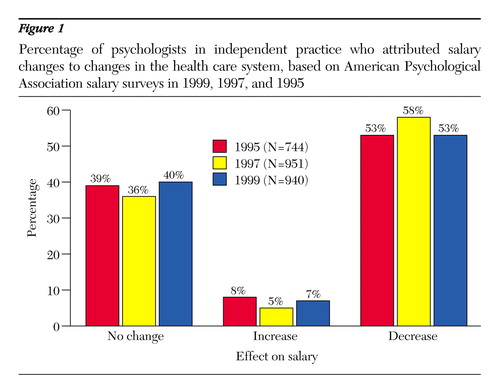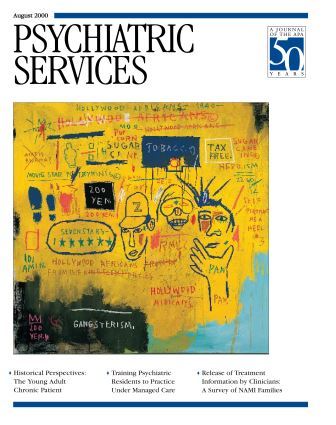Datapoints: An Update on Changes in Salaries of Psychologists in Independent Practice
The research office of the American Psychological Association conducts a biennial salary survey of psychologists. This column uses data from the 1999 survey (1) to examine how the expansion of managed care and other changes in the health care system have affected salaries of psychologists in independent practice—licensed, doctoral-level psychologists in individual private practice or in group psychological or medical practice.
The 1999 salary survey, sent to a stratified random sample of 20,000 APA members in the U.S., obtained a response rate of 51 percent. A total of 940 independent practitioners (9 percent) responded to a question about perceived salary shifts associated with changes in the health care system.
Figure 1 shows the effects on salary attributed to changes in the health care system by independent practitioners who responded to the 1999 survey and compares the findings with those from surveys conducted in 1995 and 1997 (2,3). More than half the practitioners reported a salary decrease in 1999. Forty-nine percent of those in individual practice and 61 percent in group practice reported a decrease averaging 17 percent. Only 7 percent of the respondents reported a salary hike, an average increase of 17 percent. Individual practitioners had a higher average increase (18 percent) than group practitioners (11 percent). Forty percent of practitioners reported that their salaries were not affected by changes in the health care system.
The percentage of practitioners who tied salary changes to changes in the health care system fluctuated slightly between 1995 and 1999. The salary decreases remained fairly stable, averaging 18 percent in 1995 and 17 percent in 1997 and 1999. However, the average increase was more volatile: 14 percent in 1995, 24 percent in 1997, and 17 percent in 1999. Overall, since 1995 changes in the health care system have had a more negative than positive impact on salaries of independent practitioners, particularly group practitioners.
It is important to note that these data are based on perceptions of the impact of health care reform on practitioners' salaries and were not derived from statistical comparisons of actual longitudinal salary data. However, a general comparison of the cross-sectional data on salaries for 1995, 1997, and 1999 reflected the pattern of decline described here. But despite the apparent convergence between the perception and the actual decline in salaries, other reasons may account for or contribute to the decline.
Dr. Williams is director of industry research for the American Society of Association Executives in Washington, D.C. He formerly was assistant director of the research office of the American Psychological Association, where Dr. Kohout is director and Ms. Wicherski is a research consultant. Send correspondence to Dr. Kohout, APA Research Office, 750 First Street, N.E., Washington, D.C. 20002. Harold Alan Pincus, M.D., and Terri L. Tanielian, M.A., are coeditors of this column.

Figure 1. Percentage of psychologists in independent practice who attributed salary changes to changes in the health care system, based on American Psychological Association salary in 1999, 1997, and 1995
1: Williams S, Wicherski M, Kohout JL:1999 Salaries in Psychology. Washington, DC, American Psychological Association, 2000Google Scholar
2. Wicherski M, Woerheide K, Kohout JL:1995 Salaries in Psychology. Washington, DC, American Psychological Association, 1996Google Scholar
3: Williams S, Wicherski M, Kohout JL:1997 Salaries in Psychology. Washington, DC, American Psychological Association, 1998Google Scholar



